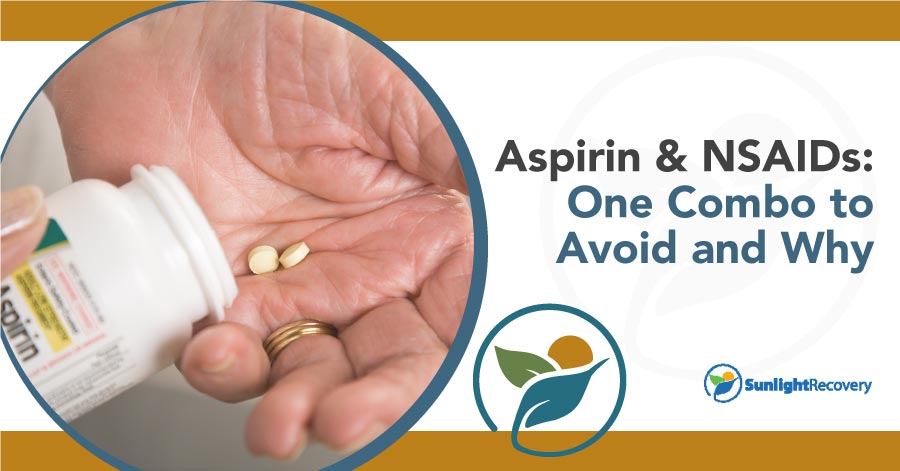Aspirin and ibuprofen are popular medicines with proven safety records. However, when mixed together, these two drugs can cause undesired side effects.
Nonsteroidal anti-inflammatory drugs (NSAIDs) is the name of a broad family of drugs that includes aspirin, ibuprofen and naproxen. According to the American Heart Association, NSAIDs are the most used drugs in America, with 70 million Americans consuming more than 30 billion doses each year. Separately, aspirin and ibuprofen are some of the safest drugs in the world, with both having strong proven track records of being safe for most individuals to use. However, when mixed together, these two drugs can cause undesired side effects.
What Are NSAIDs?
Nonsteroidal anti-inflammatory drugs are named such because they reduce inflammation in the body without the use of steroids. The two most common types of NSAIDs are aspirin and ibuprofen. These drugs work by interfering with the cyclooxygenase (COX) enzymes in the body’s cells, which in turn limit the ability of the cell to produce the prostaglandins that cause inflammation.
The primary medical uses of NSAIDs are to treat:
- Pain caused by inflammation or injury
- Headaches
- Fevers
- Arthritis
- Menstrual cramps
Side effects of taking NSAIDs, especially if taken at too high a dosage and/or for too long, include:
- Abdominal pain
- Indigestion or heartburn leading to peptic ulcers
- Nausea
- Constipation
- Diarrhea
- Headache
Note: Acetaminophen is another very common pain reliever; however, it’s not considered an NSAID. Acetaminophen doesn’t directly reduce inflammation and works by blocking pain receptors in the brain rather than interfering with enzymes in the body cells.
What Is Aspirin?
Aspirin, originally derived from the bark of willow trees, has been used in medicine for over 2,400 years. In 1853, chemists discovered and synthesized the active ingredient of aspirin, called salicylic acid. Today, aspirin is the second most popular NSAID in America.
The benefit of aspirin that set it apart from ibuprofen is that aspirin is considered a blood thinner, stopping platelets from clotting together. This makes aspirin a critical medicine to treat those suffering from cardiovascular disease and recovering from heart attacks and strokes.
However, aspirin carries a greater risk than ibuprofen for causing gastrointestinal side effects, such as peptic ulcers. For this reason, full-dose aspirin shouldn’t be used as a long-term pain relief medication.
What Is Ibuprofen?
Ibuprofen and its main ingredient, propionic acid, was invented by pharmacists in 1969. Today, ibuprofen is the most popular NSAID in America.
The advantage of using ibuprofen instead of aspirin is that ibuprofen carries less risk of gastrointestinal side effects, making it more appropriate for long-term pain relief. Additionally, ibuprofen doesn’t have a strong blood clotting effect, so it works well with individuals who have problems with bleeding.
The downside to ibuprofen is an increased risk of heart attack and stroke over the long term, so it may not be a great choice for individuals at high risk of cardiovascular issues.
Can I Take Aspirin and Ibuprofen Together?
Aspirin and ibuprofen have different active ingredients, but they’re both NSAIDs that affect the body in similar ways. Mixing the two drugs together may result in receiving too high of an NSAID dosage, thus increasing the chances of long-term side effects, including:
- Stomach bleeding
- Allergic reactions
- Ringing in the ears
In addition to causing a risk of overdose, mixing aspirin and ibuprofen may render the benefits less effective. For instance, studies published in the New England Journal of Medicine show that taking ibuprofen interferes with aspirin’s ability to reduce blood clotting by 90%. In other words, if patients are taking aspirin to reduce the risk of blood clots and heart attacks, adding ibuprofen to the mix negates nearly all aspirin’s benefits. Doctors believe ibuprofen clogs up channels in the clotting enzyme, thus blocking aspirin from doing its job.
The good news is that patients can take both medicines, and thus receive the benefits of both medicines, with the help of a doctor. They just need to be taken at safe dosages, in the proper order and with the proper time between consuming the two medications.
The U.S. Food and Drug Administration provides the following advice:
“If your doctor told you to take aspirin to help prevent a heart attack, you need to know that taking ibuprofen at the same time, for pain relief, may interfere with the benefits of aspirin for the heart. It is all right to use them together, but the FDA recommends that you contact your doctor for more information on the timing of when to take these two medicines, so that both medicines can be effective.”
What Happens If I Accidentally Combined Aspirin and Ibuprofen?
The occasional mixing of aspirin and ibuprofen is no reason for panic, and given the strong safety records of these drugs, there likely won’t be a negative impact from accidentally mixing these drugs.
Whenever taking a drug, you should be on the lookout for potential side effects. In the case of mixing aspirin and ibuprofen, the specific risks to look for are:
- Stomach bleeding
- Allergic reactions
- Ringing in the ears
Can Aspirin and Ibuprofen Be Abused?
NSAIDs don’t contain a chemical that can be considered physically or mentally addictive. They don’t cause a “high” or a sense of euphoria that users would be drawn to.
However, NSAIDs can be habit-forming, especially in patients dealing with chronic pain issues. Individuals who are in pain frequently will often turn to medication for relief. If the pain is severe and continuous, it’s easy to consume more and more medication.
In addition, it’s natural for bodies to become tolerant to frequently taken medications. This means the medicine has to be taken in higher dosages in order to stay effective. Over time, patients with chronic pain may increase their dosages to unsafe levels.
Individuals who are taking high dosages of NSAIDs or mixing different types of painkillers need to seek help from a medical professional. A doctor may be able to provide improved methods for managing chronic pain.
Contact Sunlight Recovery for Advice
If you or a loved one is taking large dosages of NSAIDs in an effort to help with chronic pain, medical help may be needed to find a healthier pain management plan. Professional help may also be required to become free of pain medicine dependency. The counselors and medical staff at Sunlight Recovery are available 24/7 to help you understand the options available to you. Contact us now at (888) 402-3647 to learn more about our drug addiction recovery programs.






